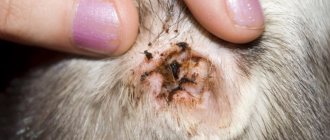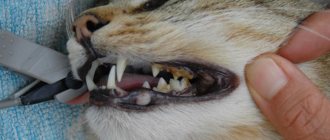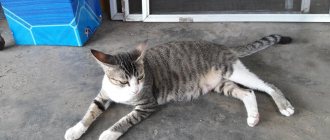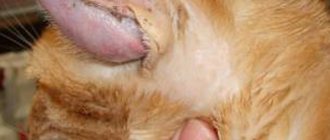The cat has a stomach ache: 9 main reasons
A cat has a stomach ache for the following reasons:
- Digestive disorders due to overfeeding or eating foods unsuitable for cats - table scraps.
- A sudden change in diet. Most often, kittens suffer when switching from milk to solid food. However, indigestion also occurs in adults when there is a sudden replacement of natural food with dry granules or vice versa. The greatest harm to the intestinal and gastric mucosa is caused by alternating natural products and factory-made ready-made foods.
- Poisoning : the cause of an eating disorder is poor-quality food, eating weakened mice during deratization, household chemicals getting into the food, or incorrectly administered medications.
- Viral infections .
- The activity of parasites - helminths or lamblia.
- Chronic diseases of internal organs - liver, pancreas.
- Urolithiasis and inflammation of the bladder.
- Pyometra is purulent inflammation of the uterus.
- Oncological diseases.
A preliminary diagnosis of the disease can be made by the cat owner based on medical history and additional signs.
Causes and symptoms
An unpleasant phenomenon can be caused by reasons so different in nature that the owner will not be able to independently understand exactly what happened to his four-legged friend unless he is a veterinarian himself. Knowing the cause of the problem, you can decide what to do if your cat has a stomach ache.
Constipation
A very common cause of abdominal pain in a cat or kitten. Due to prolonged presence in the intestines, stool becomes excessively compacted and cannot pass easily. As a result, the delicate intestinal mucosa is damaged, and the animal experiences severe pain. Constipation often develops due to the filling of the intestines with parasites. The main most noticeable symptoms of constipation are as follows :
- plaintive meow;
- restless running of the animal around the apartment;
- useless attempts in an attempt to cleanse the intestines, which the animal makes not even on the tray.
If there are sharp elements in the intestines, such as bone fragments, then they can lead to rupture of the intestines, which threatens the cat with death if the owner does not take timely measures. Symptoms that a cat has a stomach ache are dilated pupils and aggressive behavior when trying to touch the problem area.
Peritonitis
A dangerous condition in which a cat develops purulent inflammation in the abdominal cavity. The animal’s health deteriorates sharply, the cat meows in pain, its stomach swells. The temperature rises sharply and to significant levels. Even with urgent veterinary care, it is not always possible to save the pet, since the pus melts the tissues and leads to the death of organs. Successful therapy is only possible if the internal organs are not severely affected, and the animal is strong and has good immunity. Abdominal pain in cats persists for some time even after recovery.
If the disease is caused by a coronavirus, then the animal is doomed. A sick cat will live a maximum of one year. To alleviate the condition, you will need to give painkillers. The owner must understand that in the end, most likely, the pet will have to be euthanized.
Intestinal allergy
If a cat has an intolerance to any food, it may experience increased gas production, which leads to intestinal distension and causes pain. In parallel with this, the cat also develops the following symptoms :
- temperature increase;
- skin itching;
- diarrhea;
- profuse drooling;
- lacrimation.
The problem can be eliminated quite easily by giving antihistamines and a means to stop increased gas formation.
Pancreatitis
An inflammatory disease of the pancreas, which can have an acute or chronic course. When a cat is sick, pain occurs. The animal's pupils are constantly dilated due to pain, which can be very severe. There is often blood in the feces. Without treatment, your pet can easily die.
Cholelithiasis
It usually occurs in obese cats. The disease poses a serious danger, as it can cause rupture of the gallbladder if its ducts are completely blocked. When palpating the cat’s abdomen, the gallbladder is painful and enlarged due to illness.
At the moment when a sick animal develops an attack, the following symptoms of the pathological condition occur::
- severe trembling;
- temperature increase;
- jaundice.
Sometimes strong meowing is possible due to unbearable pain.
Problems of the urinary system.
Diseases of the urinary system, in which there is an increase in pressure on the internal organs of the abdominal cavity, are the reason that the cat has pain in the lower abdomen. You can notice a disturbance in your pet’s condition by the paucity of urine excreted and the presence of a small amount of blood in it.
Poisoning
A cat can get poisoned for various reasons. A dangerous condition can be triggered by eating the leaves of a poisonous houseplant or foods unsuitable for your pet. It is the latter that most often cause cat health problems. Sometimes owners try to treat their pet to something special for him and don’t even think about what they can do to him very badly. In some cases, poisoning can cause the death of a cat. Four-legged friends are poisoned by consuming the following food and drink :
- alcohol – if you give a cat a drink, the liver will cause a serious disruption in its functioning and can cause a dangerous condition, which will be accompanied by pain, vomiting, diarrhea, and if the animal’s body is weak, it can even cause death;
- chocolate and cocoa - these products can cause severe disturbances in the functioning of the cardiovascular system and pancreas. Pain after such a treat in a cat first occurs in the stomach, and then spreads to the chest;
- tea and coffee - harmful effects, the same as chocolate;
- Avocado - the substance persin is a strong toxin for cats. If you treat your pet with this delicacy, then he will experience abdominal pain, diarrhea and severe upset. If the cat has a weak heart, the treat can cause death;
- milk - adult cats cannot digest lactose, which is part of it. Because of this, their intestines are overloaded, and pain, diarrhea and vomiting occur. If the animal really wants dairy, then it should be given fermented milk products, but only in moderation. You can also treat your cat to a small amount of goat's milk, which is much easier for the cat to digest;
- feeding low-quality food - do not give cats spoiled meat and fish. They, like people, will be poisoned by them and will suffer from diarrhea, vomiting and severe abdominal pain. In case of severe poisoning, there is a serious threat to life.
A cat has a stomach ache: symptoms
The cat endures pain steadfastly and complains sharply, raising its voice.
However, the owner himself may discover that his pet is in pain based on the following signs:
- the animal is lethargic, stops jumping, prefers to lie down;
- the cat shows aggression when trying to pick it up, tries to bite, and purrs threateningly;
- assumes a forced position - the back is hunched, the appearance is hunched over.
In addition to the listed symptoms, additional symptoms appear:
- diarrhea develops or, conversely, stool retention;
- the stomach is swollen, touching it is painful;
- with breast cancer, the painful tumor is located externally;
- vomiting occurs;
- with the development of peritonitis, dehydration develops;
- blood is found in feces;
- the tongue becomes covered with a gray coating.
How to diagnose abdominal pain?
Your veterinarian will perform a physical examination of your cat and ask you about the cat's condition. He will want to know how long your cat has had abdominal pain, have you noticed other symptoms, what food is your cat eating, did he perhaps eat something he shouldn't?
We suggest you read: How long do cats live and 8 tips on how to prolong their life
Diagnostic tests will depend on the suspected cause, but may include:
- Abdominal ultrasound and/or x-ray to check organs for tumors, kidney stones, hernias, inflammation.
- Complete blood count, blood chemistry panel, and urine test to check organ function for signs of infection and/or inflammation.
- Stool tests for the presence of parasites.
The cat has a stomach ache: what to do?
When a cat develops diarrhea, the temperature is normal, and no additional pathological symptoms are detected, you can try to treat the pet at home. The most effective and safest method is a starvation diet. The kitten should be left without food for 12 hours, ignoring the plaintive meowing. An adult animal is not fed for 24 hours. Water is not limited.
If the condition has improved, feeding is resumed, and on the first day the portion is halved and divided into at least 3 doses. Milk, as well as foods rich in carbohydrates and fats, are excluded from the diet.
The best option is to temporarily switch to granular food for cats with sensitive digestion. Small portions of granules are soaked as they are eaten. Restrictive measures are extended for 2-3 days.
Every day the feed supply is increased and after a week food is resumed in full. In the future, they leave the diet food or gradually transfer it to other foods.
If your pet’s condition does not improve within 24 hours or new pathological symptoms appear, you should seek veterinary help.
Diagnosis of cat vomiting
People often forget that it is necessary not only to remove the symptom, but to understand the cause of the phenomenon. Vomit can be a symptom of various disorders in the cat's body. To understand the true cause of regurgitation, you need to look at vomiting - after diagnosis, it will become clear whether the animal requires urgent treatment, and what kind of treatment.
The cat is vomiting blood
When an owner notices blood in a cat's vomit, they may begin to panic. Should not be doing that. You need to get together and first of all study the unpleasant phenomenon.
Perhaps there is scarlet blood in the mass, or the mass itself is thick and brown. If the vomit is still brown, then there is a high chance of gastric bleeding. It could be caused by a foreign body, a tumor, an ulcerative process, liver disease, acute gastritis and some other diseases. Why brown? Because it contains not only blood, but also gastric juice.
A cat has a stomach ache: how to treat it
Self-treatment is only possible if it cannot cause harm. Such drugs exist. These are probiotics or prebiotics that restore the functioning of the digestive organs and eliminate diarrhea or constipation. Sorbents have a similar effect, of which Enterosgel is most in demand in the treatment of cats. However, the drugs mentioned may not be helpful if the cat does not improve after short-term fasting therapy.
Therefore, the choice of treatment methods, as well as the selection of drugs, is entrusted to a specialist. Depending on the disease, surgical or conservative treatment is used. Surgery is resorted to when a closed pyometra is diagnosed, that is, the outflow of purulent exudate from the uterine cavity does not occur.
In this case, the uterus with ovaries and appendages is removed and drug treatment is prescribed aimed at suppressing pathogenic microflora and healing surgical wounds.
If a tumor is detected, the veterinarian chooses between surgical removal of the tumor or chemotherapy. In pets suffering from chronic pathologies of internal organs, fluid accumulates in the abdominal cavity.
Treatment
To alleviate the cat’s condition, you should not feed it when the above symptoms appear. You need to drink warm water, and to cleanse the stomach and intestines, you can add a few drops of Vaseline oil.
The choice of drug for treatment will depend on the diagnosis. If a cat has a stomach ache due to an infection, she is prescribed antibacterial and antiviral therapy. Erythromycin and Tylosin are commonly used. If worms are detected, anthelmintic drugs will be prescribed, and antiprotozoal drugs will be prescribed to combat protozoa. If the animal is poisoned, it is necessary to cleanse the stomach with water and salt and give activated charcoal. You can induce vomiting using potassium permanganate or apomorphine.
To remove toxins and metabolic products, it is necessary to take sorbents. In case of severe pain, the veterinarian will select antispasmodics for the cat and calculate the required dosage. If urolithiasis is diagnosed, anesthetics and muscle relaxants are administered using a catheter. If the problem is advanced, an operation is performed to remove the stone or dilate the urethra. For ascites, fluid accumulated in the abdominal cavity is removed and diuretics are prescribed. If the cat has intestinal obstruction or a neoplasm, treatment will be surgical.
Peritonitis is treated comprehensively: anesthetics are given to relieve pain, then the accumulated fluid is pumped out using the puncture method. The cat is prescribed antibiotics, intravenous saline solutions, vitamins, and immunomodulators.
When a cat has a stomach ache, there can be many reasons for the unpleasant phenomenon. It is important to find out the cause of the disorder as soon as possible and carry out full treatment of the disease. In some cases, the life of the animal depends on the speed of diagnosis and initiation of treatment. Abdominal pain in a pet can be noticed by certain symptoms. The owner needs not to miss them and promptly pay attention to the deterioration of his pet’s well-being.











